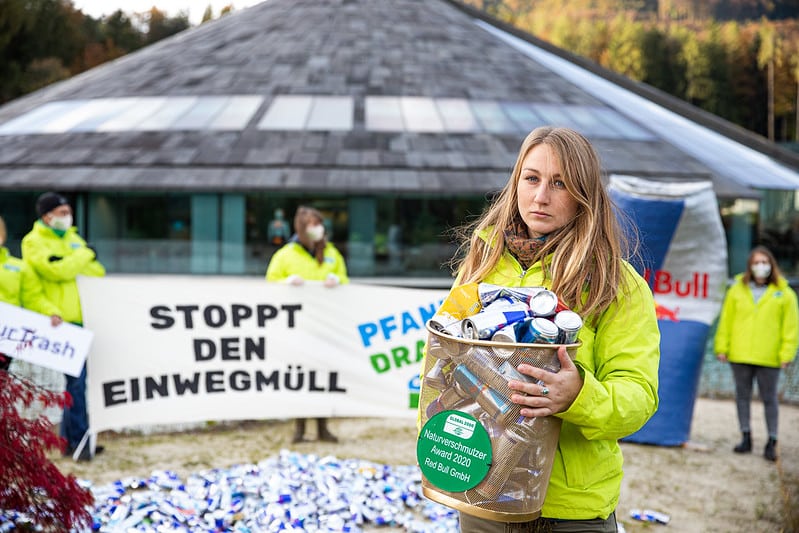Austrian energy drink company Red Bull causes massive environmental pollution, also internationally. Environmental NGOs Global 2000 (Austria), Retorna (Spain) and Recycling Netwerk (Belgium and the Netherlands) draw attention to the international litter problem caused by Red Bull. The three NGOs demand that the company supports deposit return systems in all European countries.
In Austria (23%) and The Netherlands (20.9%) the Red Bull brand is the most frequently found beverage container. The globally used Litterati app confirms this: with 25% Red Bull is the most common brand found on World Clean Up Day on September 19, 2020, ahead of Marlboro, Coca Cola and McDonalds.
Recycling Netwerk Benelux therefore supports Global 2000’s action at the Red Bull headquarters. “In our country, Red Bull is also the champion of can pollution. For 5 years in a row, Red Bull is the most littered beverage brand, and its share of Dutch litter increases every year, up to 20,9% in 2020”, Director Rob Buurman says. “Red Bull exports its waste to other countries. Therefore we strongly encourage Global 2000 in addressing this problem at the Red Bull headquarters. Red Bull should support deposit return systems in all countries where it sells cans”.
Miquel Roset, director of Retorna in Madrid, Spain, states: “Red Bull supports all kinds of outdoor sportive activities and always looks for impossible challenges. Well, the most crucial challenge nowadays is protecting our health and our environment and Red Bull can lead the way by supporting deposit and returns systems in its home country and the rest of Europe. We want to have the right of taking back bottles and cans to the shops in order to prevent the pollution caused by the littering of beverage containers. For instance, in Spain it is very common to find Red Bull cans littered in parks, roads and beaches, especially during the weekends”.
Virgin aluminium cans have a large ecological footprint
Next to tackling litter, a deposit return scheme also enables recycling of the aluminium cans. New, or virgin aluminium has a large ecological footprint. Aluminium is made from the raw material bauxite and this is mainly extracted in Australia, Guinea, China and Brazil. “This process is extremely polluting as it consumes vast amounts of energy, rainforests are being cleared and per ton aluminium up to 1.5 tons of poisonous red mud is produced, which contaminates groundwater and soil. When the raw material for the Red Bull cans will finally be in Vorarlberg or Switzerland arrives, it has already come a long way”, emphasizes Lena Steger, Resource Spokeswoman for GLOBAL 2000. “According to our calculations, Red Bull uses at least 68 million kilograms of new, virgin aluminum every year for can production. That corresponds to the weight of 420 jumbo jets.”
The difference between virgin aluminium and recycled aluminium
Using recycled aluminium instead of new, virgin aluminium in cans takes the highly polluting extraction process of bauxite out of the equation, as the material will be used again instead of being extracted for new cans. The use of recycled aluminium saves 95% of energy compared to the use of new aluminium. On their website, Red Bull boasts this fact, however, neither Red Bull nor Ball Corporation (the producer of the cans) give any information on whether recycled material is actually used in the Red Bull cans. An inquiry by GLOBAL 2000 also remained unanswered. It seems very likely that all Red Bull cans are made from virgin aluminium.
A deposit return system is needed to collect all the cans in order to make cans from recycled aluminium. At the EU level, the two major beverage manufacturers’ associations, the European Federation of Bottled Waters (EFBW) and UNESDA Soft Drinks Europe, already publicly expressed their support for national deposit return systems in all EU member states in a position paper three weeks ago. UNESDA represents the largest soft drink manufacturers in Europe, including Red Bull.
Red Bull should commit itself to change to reuse systems wherever possible and the remaining cans should be made from recycled aluminium. GLOBAL2000, Recycling Netwerk Benelux and Retorna therefore demand: “Red Bull, give Austria and the world wiiings and support a deposit return system and reusable alternatives.”

